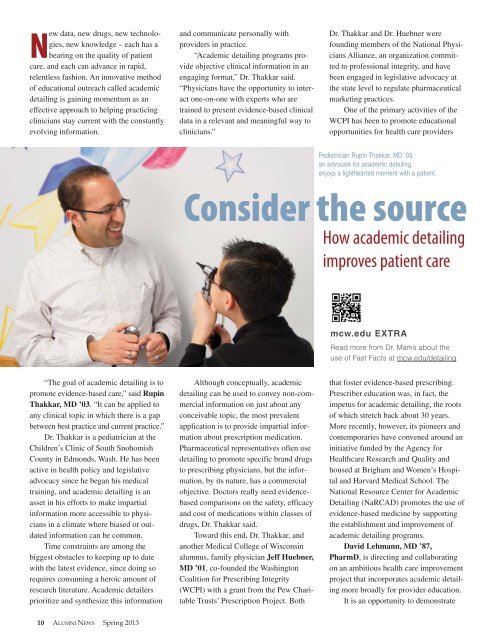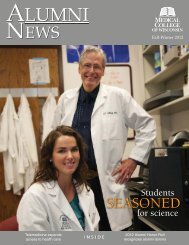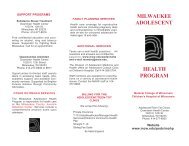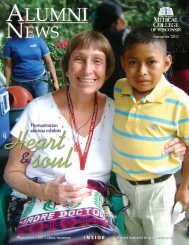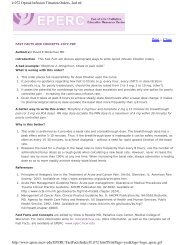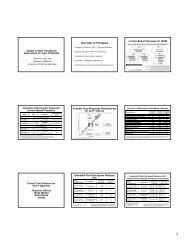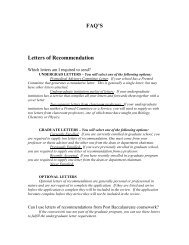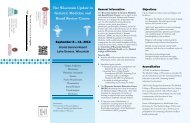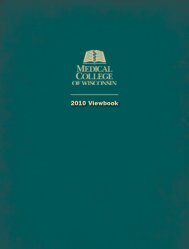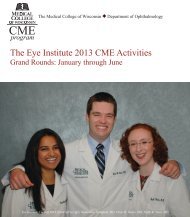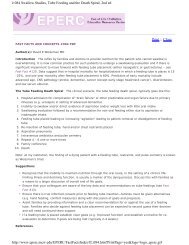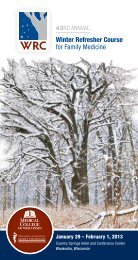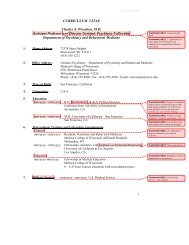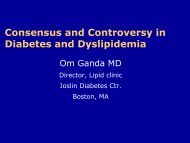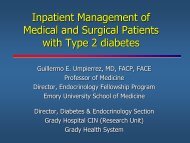Spring 2013 issue (pdf) - Medical College of Wisconsin
Spring 2013 issue (pdf) - Medical College of Wisconsin
Spring 2013 issue (pdf) - Medical College of Wisconsin
You also want an ePaper? Increase the reach of your titles
YUMPU automatically turns print PDFs into web optimized ePapers that Google loves.
New data, new drugs, new technologies,<br />
new knowledge – each has a<br />
bearing on the quality <strong>of</strong> patient<br />
care, and each can advance in rapid,<br />
relentless fashion. An innovative method<br />
<strong>of</strong> educational outreach called academic<br />
detailing is gaining momentum as an<br />
effective approach to helping practicing<br />
clinicians stay current with the constantly<br />
evolving information.<br />
and communicate personally with<br />
providers in practice.<br />
“Academic detailing programs provide<br />
objective clinical information in an<br />
engaging format,” Dr. Thakkar said.<br />
“Physicians have the opportunity to interact<br />
one-on-one with experts who are<br />
trained to present evidence-based clinical<br />
data in a relevant and meaningful way to<br />
clinicians.”<br />
Dr. Thakkar and Dr. Huebner were<br />
founding members <strong>of</strong> the National Physicians<br />
Alliance, an organization committed<br />
to pr<strong>of</strong>essional integrity, and have<br />
been engaged in legislative advocacy at<br />
the state level to regulate pharmaceutical<br />
marketing practices.<br />
One <strong>of</strong> the primary activities <strong>of</strong> the<br />
WCPI has been to promote educational<br />
opportunities for health care providers<br />
Pediatrician Rupin Thakkar, MD ’03,<br />
an advocate for academic detailing,<br />
enjoys a lighthearted moment with a patient.<br />
Consider the source<br />
How academic detailing<br />
improves patient care<br />
mcw.edu EXTRA<br />
Read more from Dr. Marks about the<br />
use <strong>of</strong> Fast Facts at mcw.edu/detailing.<br />
“The goal <strong>of</strong> academic detailing is to<br />
promote evidence-based care,” said Rupin<br />
Thakkar, MD ’03. “It can be applied to<br />
any clinical topic in which there is a gap<br />
between best practice and current practice.”<br />
Dr. Thakkar is a pediatrician at the<br />
Children’s Clinic <strong>of</strong> South Snohomish<br />
County in Edmonds, Wash. He has been<br />
active in health policy and legislative<br />
advocacy since he began his medical<br />
training, and academic detailing is an<br />
asset in his efforts to make impartial<br />
information more accessible to physicians<br />
in a climate where biased or outdated<br />
information can be common.<br />
Time constraints are among the<br />
biggest obstacles to keeping up to date<br />
with the latest evidence, since doing so<br />
requires consuming a heroic amount <strong>of</strong><br />
research literature. Academic detailers<br />
prioritize and synthesize this information<br />
Although conceptually, academic<br />
detailing can be used to convey non-commercial<br />
information on just about any<br />
conceivable topic, the most prevalent<br />
application is to provide impartial information<br />
about prescription medication.<br />
Pharmaceutical representatives <strong>of</strong>ten use<br />
detailing to promote specific brand drugs<br />
to prescribing physicians, but the information,<br />
by its nature, has a commercial<br />
objective. Doctors really need evidencebased<br />
comparisons on the safety, efficacy<br />
and cost <strong>of</strong> medications within classes <strong>of</strong><br />
drugs, Dr. Thakkar said.<br />
Toward this end, Dr. Thakkar, and<br />
another <strong>Medical</strong> <strong>College</strong> <strong>of</strong> <strong>Wisconsin</strong><br />
alumnus, family physician Jeff Huebner,<br />
MD ’01, co-founded the Washington<br />
Coalition for Prescribing Integrity<br />
(WCPI) with a grant from the Pew Charitable<br />
Trusts’ Prescription Project. Both<br />
that foster evidence-based prescribing.<br />
Prescriber education was, in fact, the<br />
impetus for academic detailing, the roots<br />
<strong>of</strong> which stretch back about 30 years.<br />
More recently, however, its pioneers and<br />
contemporaries have convened around an<br />
initiative funded by the Agency for<br />
Healthcare Research and Quality and<br />
housed at Brigham and Women’s Hospital<br />
and Harvard <strong>Medical</strong> School. The<br />
National Resource Center for Academic<br />
Detailing (NaRCAD) promotes the use <strong>of</strong><br />
evidence-based medicine by supporting<br />
the establishment and improvement <strong>of</strong><br />
academic detailing programs.<br />
David Lehmann, MD ’87,<br />
PharmD, is directing and collaborating<br />
on an ambitious health care improvement<br />
project that incorporates academic detailing<br />
more broadly for provider education.<br />
It is an opportunity to demonstrate<br />
10 ALUMNI NEWS <strong>Spring</strong> <strong>2013</strong>


